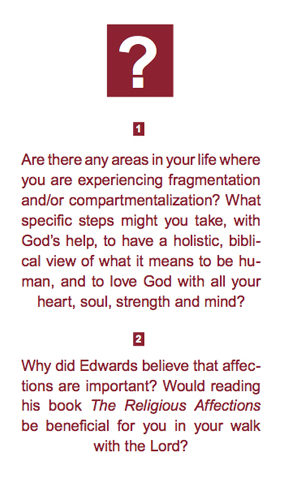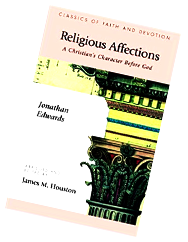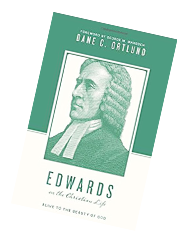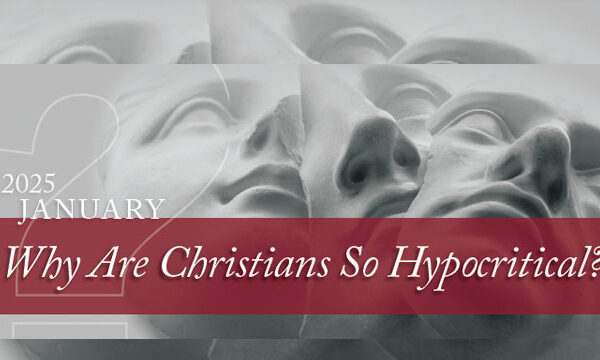Back to series


Recommended Reading:

Download or Listen to Audio
How Sweet it Is!
Click here to open a Print - Friendly PDF
Aplethora of pendulums swing within the Christian world, yanking believers from one unbalanced extreme to the opposite end with virtually no time to settle in the middle where, in many cases, the proper balance is found. One of those pendulum swings has been the ride between doctrine and devotion. At times we’ve insisted upon right beliefs with such vehemence that we’ve sounded no different from the current political firestorm. Some of us were “right” but we certainly weren’t righteous. At other times we so emphasized experience, we waffled about where the lines of orthodoxy really lie.
 Do we really need to choose only one of those — right beliefs or real experience? Doesn’t God call us to love Him with all our hearts and all our minds? Don’t the Scriptures call us to “taste and see” that the Lord is good? I find the Bible to be an amazingly balanced book, exhorting us to think right thoughts and live godly lives. In just one of hundreds of examples I could cite, Colossians 3 tells us to both set our “hearts on things above” and also to set our “minds on things above” (vv. 1–2 NIV).
Do we really need to choose only one of those — right beliefs or real experience? Doesn’t God call us to love Him with all our hearts and all our minds? Don’t the Scriptures call us to “taste and see” that the Lord is good? I find the Bible to be an amazingly balanced book, exhorting us to think right thoughts and live godly lives. In just one of hundreds of examples I could cite, Colossians 3 tells us to both set our “hearts on things above” and also to set our “minds on things above” (vv. 1–2 NIV).
In that same chapter, we’re commanded to “put to death” all sorts of evil desires (vv. 5–10) and “let the peace of Christ rule” in our hearts (v. 15). That sounds rather experiential. But we’re also told to “let the word of Christ dwell in” us, which works itself out with such things as teaching, admonishing, and wisdom (v. 16). That sounds rather intellectual.
And, oh, by the way, isn’t it intriguing that, of all the ways God could have chosen to reveal truth to us, He included a book! That’s far more cognitive and intellectual than some today want to acknowledge. I’ll push it further. Given the lofty things God’s Word says about God’s Word (consider the longest chapter of the longest book of the Bible, Psalm 119), shouldn’t we prioritize right thinking as an important part of exalting God and living lives worthy of our calling? I get nervous when I hear someone denigrate the importance of knowledge or doctrine or thinking in favor of emotions or zeal or “the heart.” Never mind the self-refutation of their need to use words and logic to convince others of the unimportance of words and logic. The biggest problem of that approach is that the Bible simply won’t support it.
In fact, to say that the Bible is balanced between mind and heart is not quite right. The Bible is holistic. It doesn’t see thought and emotion as two different components of our being to be “balanced.” We are whole persons with our thoughts and feelings inseparably melded together.
Even some of the central words of the Bible, used to describe our natures, are words that defy categorization into intellectual or emotional compartments. The Hebrew word often translated “soul,” nefesh, to name just one biblical term, refers to our whole lives with implications about the ideas we think, the emotions we feel, the attitudes we develop, and the lifestyles we practice.
When I was a new believer, the book many of my fellow Christian students read was J.I. Packer’s Knowing God. And I joined them. And I loved it. Packer challenged countless readers to think deeply about God, His character, His ways, and His teaching. But I look back and wonder if the book may have been tilted a bit too much toward the cerebral, needing more mention of affection. Years later, my Christian cohorts read Henry Blackaby’s Experiencing God. And I joined them. And I liked it. (I realize I said “liked” not “loved.” I prefer Packer’s work. I regularly return to Knowing God for refreshers. So far, I haven’t done that with Experiencing God.) Looking back, I fear that the two books point to yet another pendulum ride within the body of Christ.
 Fragmentation and compartmentalization came from nonbiblical cultures and philosophies, such as the Greeks, and got entrenched in our ways of thinking through equally bad influences, such as the so-called Enlightenment. Getting “back to the Bible” means pursuing a holistic vision for what it means to be human and what that looks like in every way. Then we will love (not just know or experience!) God with all our heart, soul, strength, and mind.
Fragmentation and compartmentalization came from nonbiblical cultures and philosophies, such as the Greeks, and got entrenched in our ways of thinking through equally bad influences, such as the so-called Enlightenment. Getting “back to the Bible” means pursuing a holistic vision for what it means to be human and what that looks like in every way. Then we will love (not just know or experience!) God with all our heart, soul, strength, and mind.
And that’s why I love (not just like) Jonathan Edwards’s classic The Religious Affections (1746), one book I believe gets right the holistic image of our humanity. If I had to choose a thesis statement for the book it would be “True religion, in large part, consists of holy affections.”1 Edwards wanted his hearers and readers to know that just having an opinion about God or believing the right propositions about God doesn’t make one a Christian. Saving faith must be felt as well as understood.
Consider just a few samples from this volume:
“The religious life contains things too great for us to be lukewarm.”2
“I am bold to assert that no change of religious nature will ever take place unless the affections are moved.”3
“There is no other reason why we should express ourselves to God in verse rather than in prose and with music, except that these things have a tendency to move our affections.”4
And Edwards saw these affections stirred by the intellect and right thinking. “Knowledge, then, is the key that first opens the hard heart, enlarges the affections, and so opens the way for men to enter the Kingdom of Heaven.”5 Reading The Religious Affections, it’s obvious that Edwards didn’t see affections as an end in themselves. They were and are part and parcel of a godly life that includes obedience and effort. He wrote, “The great Christian duty is self-denial. This duty consist in two things: first, in denying worldly inclinations and its enjoyment, and second, in denying self-exultation and renouncing one’s self-significance by being empty of self.”6 It is not difficult to grasp the purpose or aim of Edwards’s work. The outline of the book shows it quite clearly.
Part 1: Concerning the nature of the affections and their importance in religion.
Part 2: Showing what are no certain signs that religious affections are truly gracious, or that they are not.
Part 3: Showing what are distinguishing signs of truly gracious and holy affections.7
Put simply, Edwards wanted people to recognize the vast chasm between true faith and its many counterfeits. The church today could benefit greatly from a healthy dose of Edwards’s clarity.
But I must quickly offer some cautions about reading Edwards. He’s not easy. Fortunately, we have a lot of aids to help us along the way. As part of an endorsement for a very helpful series, The Edwards Collection,8 New Testament scholar D.A. Carson wrote, “Everyone says Jonathan Edwards is important. Quite frankly, however, his writing style is pretty dense by contemporary standards, so few pastors and other Christian leaders have invested much time reading him.” The Essential Edwards Collection edited by Owen Strachen and Doug Sweeney presents an introduction to and a multitude of quotations from Edwards’s thought in ways that are accessible and tremendously helpful.
 The edition of Religious Affections that I used for citations in this article is edited by C.S. Lewis Institute co-founder James Houston and makes the work more readable and beneficial than just the bare text without annotations. Houston’s section headings and many side notes brought the book to life to me, even though I had twice previously read the plain text without any aids.
The edition of Religious Affections that I used for citations in this article is edited by C.S. Lewis Institute co-founder James Houston and makes the work more readable and beneficial than just the bare text without annotations. Houston’s section headings and many side notes brought the book to life to me, even though I had twice previously read the plain text without any aids.
In my opinion, the best way to wade into Edwards’s writing is through his sermons. I never get bogged down in them the way I have in some of his longer works. There are numerous collections of his sermons available. I return to them for refreshers from time to time and always find them inspiring. Some of my favorites are “God Glorified in Man’s Dependence”; “Jesus Christ the Same Yesterday, Today, and Forever”; and “A Divine and Supernatural Light.”
I do realize that many people in our day and age think of Edwards only through the lens of his most famous sermon, “Sinners in the Hands of an Angry God.” I think this is rather unfortunate, because that particular sermon is dramatically unlike most, if not all, his other sermons and most of his longer writings. It’s certainly not one of his better sermons. I’ll even go so far as to say it’s not as biblically sound as most of his other sermons. I suspect that non-Christians like to hold up that particular sermon as a caricature of what it means to be a Christian. Why else is it, and it alone, a required reading in many secular high school English class curricula? I detect a straw man.
 One image from Edwards’s sermon “A Divine and Supernatural Light” serves as a gateway for all his other works, elaborated magnificently in The Religious Affections.
One image from Edwards’s sermon “A Divine and Supernatural Light” serves as a gateway for all his other works, elaborated magnificently in The Religious Affections.
It is the memorable illustration of tasting honey. Edwards wrote, “There is a difference between having an opinion, that God is holy and gracious, and having a sense of the loveliness and beauty of that holiness and grace. There is a difference between having a rational judgment that honey is sweet, and having a sense of its sweetness.”9
Edwards’s writings, which most often feel like extended meditations on a single truth from Scripture, help me know, with all my being — intellect, emotions, and will — that God is good, His grace is amazing, His nature is holy, His word is delightful, His love is beautiful, and His salvation is breathtaking. They’ve even changed my experience of slowly savoring a teaspoonful of honey!
For more information about Jonathan Edwards, see “Profiles in Faith: Jonathan Edwards (1703-1758)”, by Art Lindsley, published in the Spring 2001 issue of Knowing & Doing (which was then called the C.S. Lewis Institute Report).
|
Notes: |
|||

Randy Newman
Senior Fellow for Apologetics and Evangelism, CSLIRandy Newman (1956-2024) was the Senior Fellow for Apologetics and Evangelism at the C.S. Lewis Institute. He taught at several evangelical seminaries. After serving for over 30 years with Campus Crusade for Christ, he established Connection Points, a ministry to help Christians engage people’s hearts the way Jesus did. He has written seven books, Questioning Evangelism, Corner Conversations, Bringing the Gospel Home, Engaging with Jewish People, Unlikely Converts: Improbable Stories of Faith and What They Teach Us About Evangelism, Mere Evangelism. and his most recent, Questioning Faith: Indirect Journeys of Belief through Terrains of Doubt. Randy has also written numerous articles about evangelism and other ways our lives intertwine with God’s creation. He earned his MDiv and PhD in Intercultural Studies from Trinity International University. Randy went home to be with the Lord in May 2024.

Recommended Reading:
Jonathan Edwards, Religious Affections: A Christian’s Character Before God, abridged and edited by James M. Houston, introductory essay by Charles Colson (Regent College Publishing, 2003)
In the wake of recent revival movements, Christians need Jonathan Edwards’ classic Religious Affections more than ever. Edwards, the central figure in New England’s first Great Awakening, offers here his most detailed description of the signs false and true of revival, while highlighting the role truly balanced emotions play within the Christian life. An engaging introductory essay by Charles Colson details the impact of Religious Affections on his own life and its implications for today’s church.
Dane C. Ortlund, Edwards on the Christian Life: Alive to the Beauty of God (Crossway, 2014)
Jonathan Edwards is widely hailed as the greatest theologian in American history. In Edwards on the Christian Life, Dane Ortlund invites us to explore the great eighteenth-century pastor’s central passion: God’s resplendent beauty. Whether the topic was the nature of love, the preeminence of Scripture, or the glory of the natural world, the concept of beauty stood at the heart of Edwards’s theology and permeated his portrait of the Christian life. Clear and engaging, this accessible volume will inspire you to embrace Edwards’s magnificent vision of what it means to be a Christian: enjoying and reflecting of the beauty of God in all things. This book is part of Crossway’s Theologians on the Christian Life series.
 COPYRIGHT: This publication is published by C.S. Lewis Institute; 8001 Braddock Road, Suite 301; Springfield, VA 22151. Portions of the publication may be reproduced for noncommercial, local church or ministry use without prior permission. Electronic copies of the PDF files may be duplicated and transmitted via e-mail for personal and church use. Articles may not be modified without prior written permission of the Institute. For questions, contact the Institute: 703.914.5602 or email us.
COPYRIGHT: This publication is published by C.S. Lewis Institute; 8001 Braddock Road, Suite 301; Springfield, VA 22151. Portions of the publication may be reproduced for noncommercial, local church or ministry use without prior permission. Electronic copies of the PDF files may be duplicated and transmitted via e-mail for personal and church use. Articles may not be modified without prior written permission of the Institute. For questions, contact the Institute: 703.914.5602 or email us.
-
Recent Podcasts
From Anti-Christian to Pastor – Brian Smith’s Story
by Jana Harmon, Brian Smith on January 17, 2025Brian grew up in a small Georgia town...Read More
-
Time With God
by Aimee Riegert, J.I. Packer on January 10, 2025
-
Faith and Reason – Henare Whaanga’s Story
by Henare Whaanga, Jana Harmon on January 3, 2025
-
Recent Publications
Why Are Christians So Hypocritical?
by William L. Kynes on January 1, 2025Oh, the hypocrisy of those Christians—they talk so...Read More
-
How Artists and Their Art Can Point Us to the Creator
by Russ Ramsey on December 2, 2024
-
What about Jesus’s Childhood?
by Jim Phillips on December 1, 2024
0
All Booked
0.00
All Booked
0.00
All Booked
23931
GLOBAL EVENT: Sentenced to Death with Maryam Rostampour-Keller, 8:00PM ET
https://www.cslewisinstitute.org/?event=global-event-sentenced-to-death-with-maryam-rostampour-keller-800pm-et&event_date=2025-02-07®=1
https://www.paypal.com/cgi-bin/webscr
2025-02-07

Next coming event
Days
Hours
Minutes
Seconds
GLOBAL EVENT: Sentenced to Death with Maryam Rostampour-Keller, 8:00PM ET
On February 7, 2025 at 8:00 pmSpeakers

Randy Newman
Senior Fellow for Apologetics and Evangelism, CSLI
Team Members

Randy Newman
Senior Fellow for Apologetics and Evangelism, CSLIRandy Newman (1956-2024) was the Senior Fellow for Apologetics and Evangelism at the C.S. Lewis Institute. He taught at several evangelical seminaries. After serving for over 30 years with Campus Crusade for Christ, he established Connection Points, a ministry to help Christians engage people’s hearts the way Jesus did. He has written seven books, Questioning Evangelism, Corner Conversations, Bringing the Gospel Home, Engaging with Jewish People, Unlikely Converts: Improbable Stories of Faith and What They Teach Us About Evangelism, Mere Evangelism. and his most recent, Questioning Faith: Indirect Journeys of Belief through Terrains of Doubt. Randy has also written numerous articles about evangelism and other ways our lives intertwine with God’s creation. He earned his MDiv and PhD in Intercultural Studies from Trinity International University. Randy went home to be with the Lord in May 2024.







